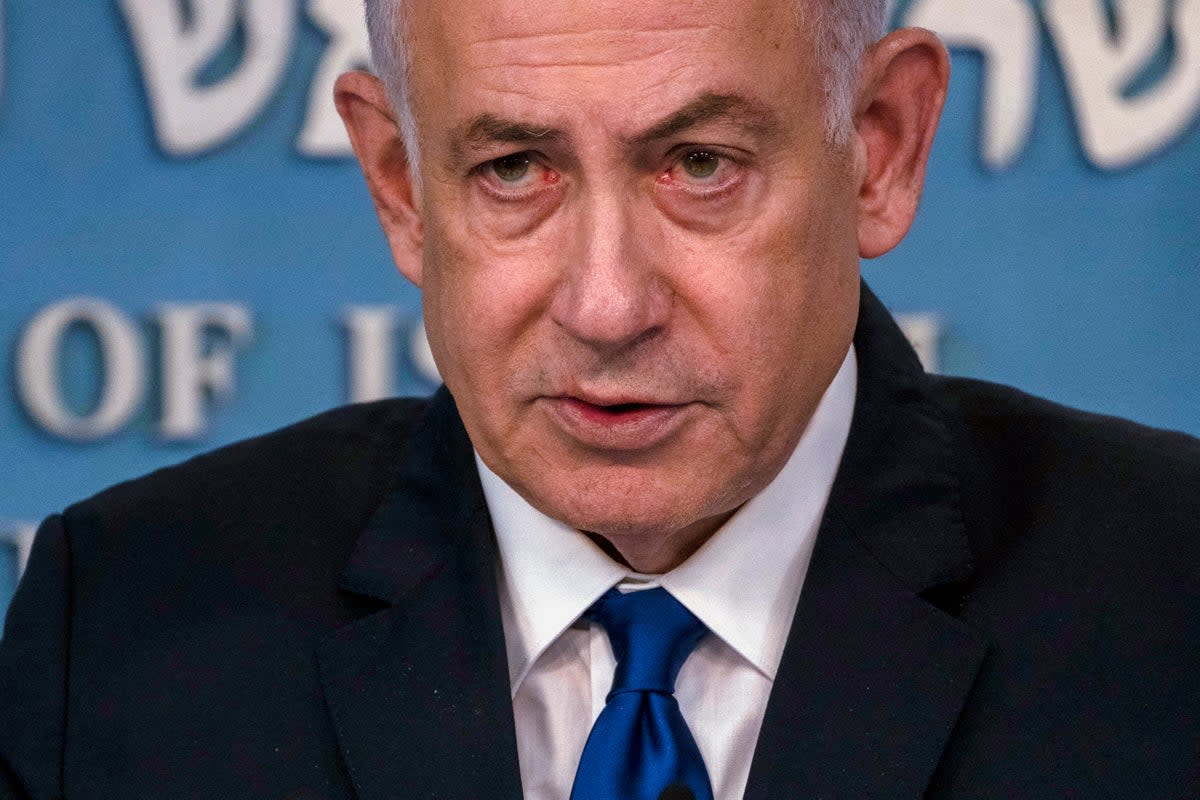Netanyahu spoke with Republican Senators. What he said was typical of his diplomatic approach

Today, Senate Republicans hosted a closed-door meeting with Israeli Prime Minister Benjamin Netanyahu, who attended a lunch via video call.
The call was announced with little notice — even some Republicans weren’t aware of it until moments before. When The Independent asked Senator Todd Young, a Republican on the Foreign Affairs Committee, for his prediction on how the meeting would go less than an hour before the lunch began, he revealed he wasn’t aware Netanyahu was even on the schedule.
The conversation concerned the current status of the Israel-Hamas war, with Netanyahu discussing the Israel Defense Forces’ planned invasion into Rafah. More than 1.4 million Palestinians are currently in the southern Gaza city after being displaced from the north by Israeli attacks. Netanyahu told Senate Republicans an invasion was necessary and that the IDF is committed to seeing it through, Senator Josh Hawley told reporters afterwards.
As Palestinians brace for a potential Rafah invasion, the United Nations, the European Union and several international aid agencies are warning of an imminent, widespread famine in Gaza.
Many Democrats criticized the meeting and Netanyahu’s politicization of the war. Senate Majority Leader Chuck Schumer went so far as to reject Netanyahu’s request to speak with Democrats, saying these conversations should not happen in a “partisan manner,” Punchbowl News reported.
Senator Elizabeth Warren launched similar criticisms in discussion with The Independent.
“Prime Minister Netanyahu may serve his own political interests, but he is not serving the interests of the people of Israel,” the Massachusetts Democrat told The Independent. “He thinks that the only way that Israel will get the support that helps Netanyahu is through the Republican Party.”
Yet, for the Israeli prime minister, this meeting was par for the course, even amid the extraordinary circumstances of the Israel-Hamas war. Netanyahu, who spent much of his youth in the US, has often inserted himself in American politics, and he has frequently needled Democrats while propping up Republicans.
When Netanyahu first met Bill Clinton in 1996 upon becoming prime minister, Clinton famously asked “Who’s the f***ing superpower?” In 2002, during George W Bush’s build-up to the Iraq War, in between his first and second tenure as prime minister, Netanyahu testified before Congress in support of invading Iraq.
In 2011, amid numerous protests and upheavals during the so-called Arab Spring, Barack Obama called for a peace plan for Israel where “the borders of Israel and Palestine should be based on the 1967 lines with mutually agreed swaps.” That prompted Netanyahu to deliver a thundering joint address to Congress, during which he defiantly declared (with then-vice president Joe Biden sitting behind him) that “Israel will not return to the indefensible boundaries of 1967.”
In 2012, Netanyahu tried to put his thumb on the scale for his old friend Mitt Romney, whom he had known since they were young men in Massachusetts working for the Boston Consulting Group, and invited Romney to Israel during the campaign. (Romney, meanwhile, told The Independent on Wednesday it would be “good to hear” from Netanyahu at the lunch. He otherwise provided no comment on the discussions.)
But the Israeli prime minister’s biggest act of defiance came in 2015, when then-House Speaker John Boehner invited Netanyahu to speak without telling the Obama administration. Netanyahu did so in a last-ditch attempt to sink the Iran nuclear agreement that the Obama administration was brokering. The move not only angered the Obama White House but also infuriated many Democrats. Senior Democrats such as the late civil rights activist John Lewis and other prominent members of the party — including current House Democratic Whip Katherine Clark — boycotted his address to Congress.
Netanyahu has tussled with Biden in the past. In 2010, as tensions between Obama and the Israeli prime minister reached a fever pitch, Netanyahu announced the creation of new settlements in the West Bank just as Biden, a longtime foreign policy hand, arrived in Israel.
However, Netanyahu refrained from criticising the president during his talk with Republicans today, Hawley told reporters afterwards, despite Biden’s concerns about the invasion into Rafah. Instead, he attacked Senate Majority Leader Chuck Schumer, who gave a speech last week condemning Netanyahu’s government and calling for an election to replace him.
Now, all eyes will be on a meeting between an Israeli delegation and members of the Biden administration concerning the country’s plan to invade Rafah. White House National Security Adviser Jake Sullivan said the US would not support the offensive “without a credible plan” from the IDF, while Biden said he would consider conditioning aid to Israel if the invasion moves forward.


